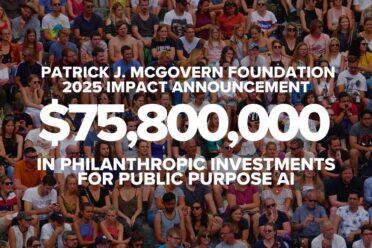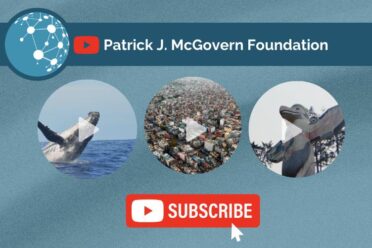Foundation awards $5.7 million to support vulnerable communities as pandemic surges
BOSTON (December 17, 2020) – The Patrick J. McGovern Foundation announced today $5.7 million in grants to support vulnerable communities through the pandemic and to bring trusted COVID-19 data and analysis to policymakers and the public.
The 21 grants are the latest of the Foundation’s COVID-19 response and community support commitments in 2020, totaling $14.7 million since March. More than $3.7 million will address the mounting crises of hunger, homelessness, and under-employment and unemployment across the United States, and $1.15 million will support ongoing social justice efforts for refugees, migrants, gender equality, and formerly gang involved and previously incarcerated individuals.
“COVID-19 has brought devastation and heartache to our communities. As winter approaches and the holidays near, the needs are great,” said Foundation President Vilas Dhar. “These commitments to relieve hunger, prevent homelessness and offer new employment opportunities reflect our belief that our challenges are best faced as a community, joining hands together in shared support and empowerment.”
In addition, the Foundation is expanding its support for initiatives that provide healthcare leaders, policymakers, and the public with accurate scientific data, news and analysis, and storytelling of the pandemic and its effects. Earlier grants for trusted data and information have been awarded to The Atlantic’s COVID Tracking Project; The Marshall Project’s data-driven coverage of race, COVID-19 and the criminal justice system; and to Northeastern University to map the spread of the virus.
“These commitments to relieve hunger, prevent homelessness and offer new employment opportunities reflect our belief that our challenges are best faced as a community, joining hands together in shared support and empowerment.”
–President Vilas Dhar
In March, the Trustees of the Patrick J. McGovern Foundation launched a rapid-response COVID-19 relief effort focused on health systems, COVID-19 data and research, and the urgent needs of communities and families hardest hit by the pandemic. This work included providing support for safe housing for the highest risk homeless individuals in Boston’s Pine Street Inn shelters, the development of clinical protocols and a new vaccine allocation planner by Ariadne Labs, and the deployment of telemedicine in community health centers across Massachusetts by the Community Care Cooperative.
This next wave of grants to nonprofits at the frontline of social change aims to fortify their critically important work at a time of ongoing economic, social and health disruptions. “These organizations are bright lights, leading with purpose and integrating the innovative use of technology where it helps leverage their impact,” said Dhar. “Their efforts to solve structural inequities and injustices will be more important than ever as we emerge from a global pandemic that has laid bare the need for systemic change.”
The new grants include:
Hunger Relief
The Common Market to scale technological infrastructure to bring farm fresh food to shelters, senior citizens and young families in need ($500,000)
Greater Boston Food Bank to address the growing hunger crisis as the pandemic worsens and winter approaches ($500,000)
World Central Kitchen to support pandemic food relief efforts, and help devastated communities recover and establish resilient food systems ($500,000)
Team Rubicon to support ongoing food support services for food banks and vaccine coordination for communities in crisis ($500,000)
Housing and Homelessness
Homeless Youth Alliance, to support outreach and services for youth experiencing homelessness in the Haight Ashbury neighborhood of San Francisco. ($250,000)
Metro Housing|Boston to help provide personalized services that lead families and individuals to housing stability, economic security, and an improved quality of life ($250,000)
Destination: Home to expand research and data analysis surrounding homelessness in Santa Clara County, CA ($100,000)
Vulnerable communities
Homeboy Industries in support of their work providing hope, job training and support to formerly gang-involved and previously incarcerated men, women and youth in a community of kinship and healing ($100,000)
Justice in Motion to defend the legal rights of migrant workers and reunite separated children and parents through the Defender Network ($100,000)
RefUnite to combat the spread of COVID-19 misinformation throughout refugee communities in Africa with Relay, a digital information network connecting trusted community intermediaries ($250,000)
The Share Trust to support a network of Community Based Organizations (CBO) in Uganda by working with RefUnite to develop the Relay digital platform ($100,000)
Equality Fund to drive social change for gender equality in the Global South ($100,000)
UCSF HEAL Initiative to support fellowships for healthcare professionals to serve vulnerable populations across nine countries and Navajo Nation during the pandemic and beyond ($500,000)
Trusted Data and Information
COVID Act Now to support accurate, real-time data about COVID-19 presence and spread across the United States to help policymakers limit the spread and severity of the pandemic ($200,000)
The New Humanitarian to support independent journalism and coverage of the pandemic and its impacts on ongoing humanitarian crises to inform global response and policy ($500,000)
The Nocturnists to support the Stories from a Pandemic series, cultivating humanistic values and creative expression in the practice of medicine ($100,000)
Workforce Development
Entrepreneurship for All (EforAll) to accelerate economic and social impact in communities across the country through inclusive entrepreneurship ($100,000)
ReWerk to expand redistribution of unused office inventory and technology equipment to vulnerable communities ($50,000)
Education Design Lab to support the Community College Growth Engine Fund, which is working with six community colleges and systems to create new earn-and-learn micro-pathways designed to connect low-wage and entry-level workers to in-demand jobs that pay at-or-above median wage and put them on a path toward a degree. ($500,000)
The HOPE Program to provide skills, networks and job opportunities for New York City individuals experiencing homelessness, exiting the criminal legal system, overcoming substance use disorders, and/or facing other barriers to employment. ($250,000)
Rework America Alliance, a Markle Foundation initiative and nationwide collaboration working to enable unemployed and low wage workers to emerge stronger from the current public health and economic crisis by moving into good jobs in the digital economy ($250,000)


